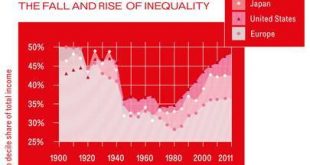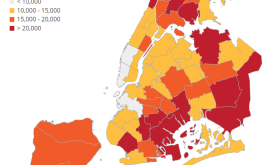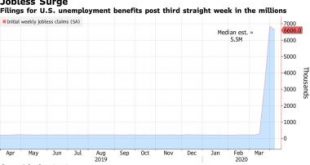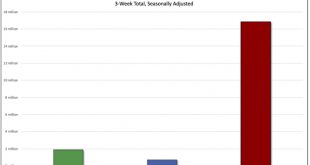from Lars Syll A low-powered study is only going to be able to see a pretty big effect. But sometimes you know that the effect, if it exists, is small. In other words, a study that accurately measures the effect … is likely to be rejected as statistically insignificant, while any result that passes the p < .05 test is either a false positive or a true positive that massively overstates the … effect. … A conventional boundary, obeyed long enough, can be easily mistaken for an actual...
Read More »The fall and rise of inequality
source
Read More »Why millennials will lose out to Covid-19
from WEA Young Economists
Read More »Tale of two cities
from David Ruccio sources [frontline workers, coronavirus cases] As the Guardian explained earlier today, the coronavirus has discriminated in inflicting its terrible toll on the two very different cities that make up New York City. Different boroughs, even different neighborhoods within each borough, are experiencing coronavirus almost as though it were two different contagions. In wealthier white areas the residential streets are empty; parking spots that are fought over in normal...
Read More »Le Bolero en #confinement
[embedded content]
Read More »The post-pandemic economy
from Dean Baker We have a lot of economist type people telling us how awful the economy will be once we get through our near-term shutdown period. At the risk of being accused of unwarranted optimism, I am not sure I buy the pessimists’ story. Before saying anything about the economy, we have to outline where we think our containment efforts are headed. I will throw out my story, which people here who know what they are talking about can correct. Let’s assume that after two months we have...
Read More »Coronavirus pandemic cripples U.S. economy
from Lars Syll The economic toll tied to the coronavirus pandemic intensifies. Over the last three weeks, more than 16 million Americans have made unemployment claims. The unemployment rate is now over 10%. In the coming weeks, more people will face income and job losses. So how do we get out of this unprecedented crisis? To both Keynes and Lerner, it was evident that the state has the ability to promote full employment and a stable price level — and that it should use its powers to do...
Read More »Forget about economics and the pandemic: here’s The Beatles’ last concert to cheer you up
from Thomas Palley On a cold day in January 1969, The Beatles, who hadn’t played live since 1966, took to the rooftop of the headquarters of Apple Records, located at 3 Savile Row, in central London. And there they played an impromptu last gig, much to the delight of Londoners on nearby rooftops … and to the chagrin of the police. [embedded content]
Read More »16 million American workers have filed initial unemployment claims during the past three weeks.
from David Ruccio This morning, the U.S. Department of Labor (pdf) reported that, during the week ending last Saturday, another 6.61 million American workers filed initial claims for unemployment compensation. That’s on top of 6.65 million workers who were laid off during the week ending 28 March and another 3.31 million in the previous week. All told, more than 16 million American workers have filed initial claims during the past three weeks. To put that into some kind of...
Read More »The world was a mess before anyone ever uttered the word coronavirus
from Ken Zimmerman According to the UN (and many others) the world was a mess before anyone ever uttered the word coronavirus. These problems remain waiting for us after the current crisis fades. 1. We have a decade to significantly curb carbon emissions and avoid catastrophe. Because of years of delayed action, we face an even more pressing mandate. We need to halve global emissions by 2030 but the emissions gap between what is needed and our current commitments is significant. Starting...
Read More » Real-World Economics Review
Real-World Economics Review





